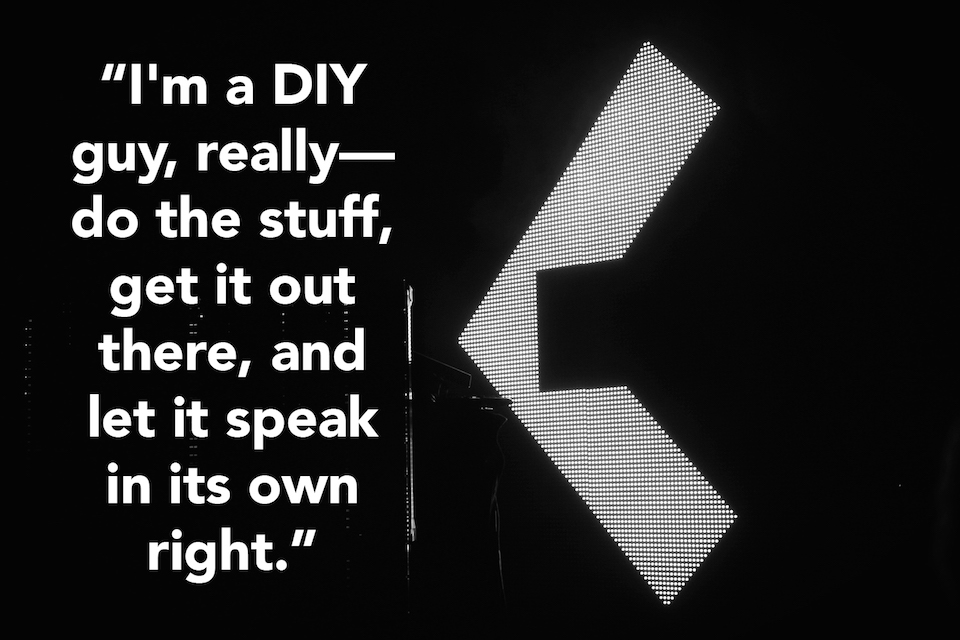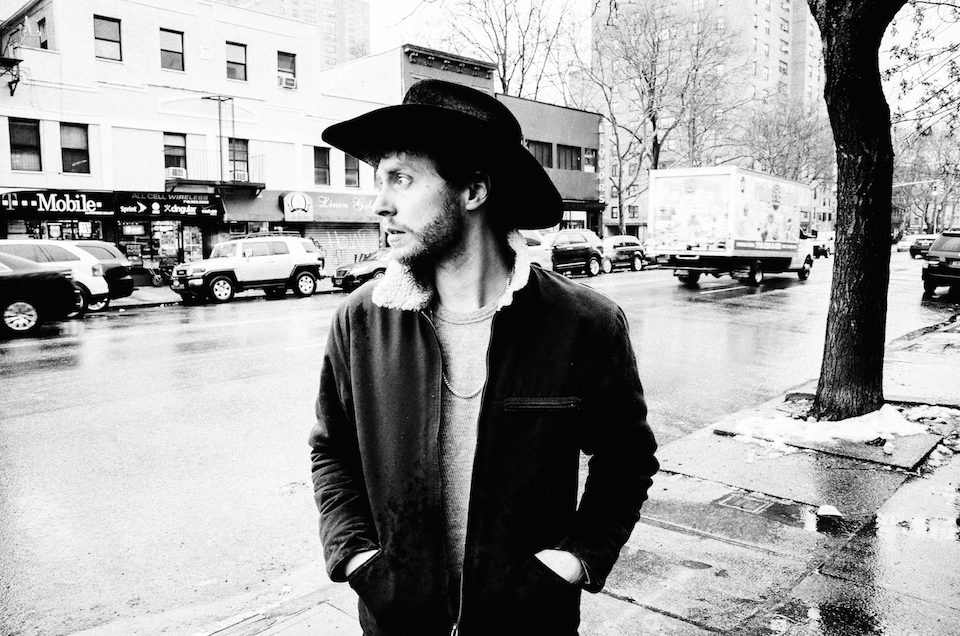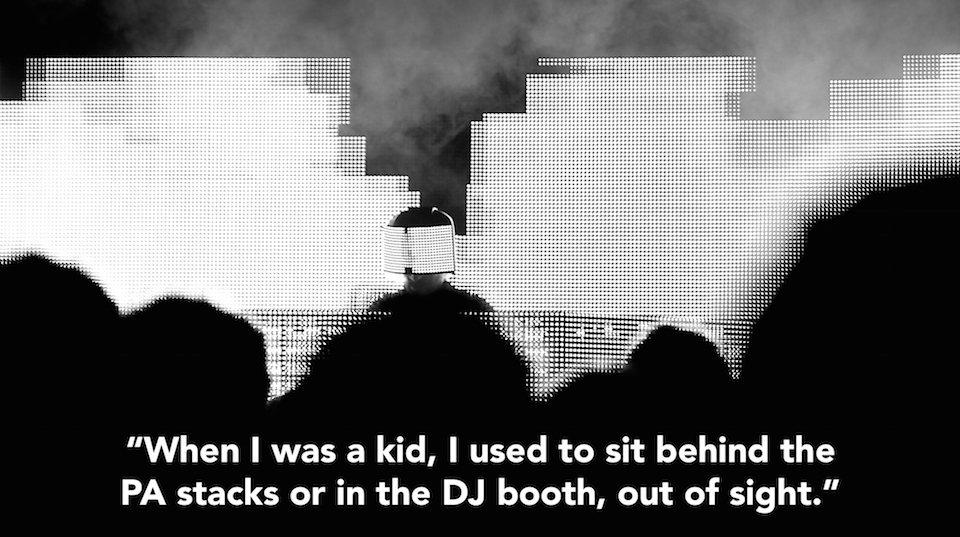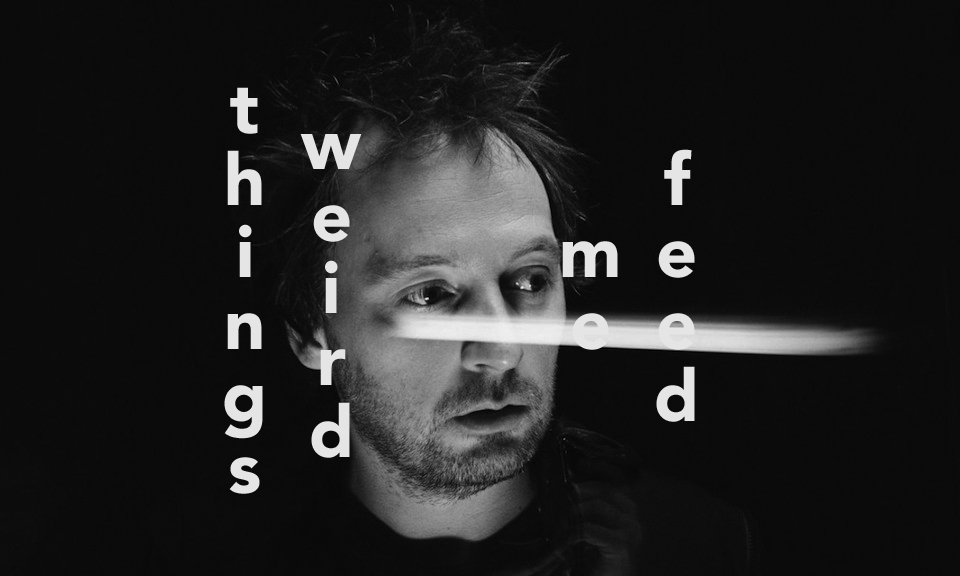In a Wondering Sound interview last year, Drew Lustman admitted he was more nervous meeting Squarepusher than he was the time his FaltyDL project opened for Thom Yorke.
“Remember when that reporter at the Grammys had a stroke in the middle of an interview?” Lustman asked. “It was like that. Tom was like, ‘You all right mate?’ It was very funny.”
Since the Warp vet was set to support his Damogen Furies album in New York this week—the very same week Lustman released his restless dance record, The Crystal Cowboy (Planet Mu)—we thought we’d stage a reunion at Tom Jenkinson’s hotel. In the following exclusive, he fields Lustman’s questions, and fires back with some of his own…
Drew Lustman: It seems like records informed tours 10 years ago, and now you can have a SoundCloud, just put a few tracks out there, get a little bit of a following, and then you can tour off the back of that. It’s changing a lot.
Tom Jenkinson: Yeah, you tell me. I don’t know.
Drew: Am I the link to what’s going on these days?
Tom: Temporarily.
Drew: When I was getting ready for this, I noticed there’s no real Twitter or Instagram [for you], none of the things a lot of us feel like we have to do these days. There’s a Facebook presence, of course, but it’s just a page. Has it ever felt like you didn’t want to play that game? Or is it just a generational thing?
Tom: Well all of those things have developed since I got signed and started operating in the public sphere. I’ve always tried to negotiate the minimum level of engagement with the industry itself and conventions like publicity and so on. All of the things you’re talking about, they’re a means by which you get publicity and distribute news, but you know… I don’t really care about that kind of thing. There’s no thrill for me sort of selling myself. I don’t want to communicate with anyone just simply on the basis of telling them to buy something or even go to a show. I want them to make up their own minds. I don’t like pushing people around. From what I can see, musicians, amongst other people, are being obliged to become their own sort of advertising agents. Advertising is an area of human endeavor I find revolting. I don’t want to engage with it at all; pushing people around to spend money is not my cup of tea.
I’ve tried to adhere to the principle of letting the music do that on my behalf. If it can spread the story in its own right, that’s fine. I also quite like leaving things to people’s imaginations rather than ramming the story down is people’s throats.

Drew: Right. Well, with myself, coming up with a press campaign these days is like writing a BuzzFeed article. I’m just grasping at straws for what’s going to be interesting, what’s going to be this “story”. Well the story was just me sitting in my underwear making tunes at night and having a really fun time. Like I’ve done an album about falling in love to a degree, but at this point, it just feels like the best tracks I’ve made recently. I’m into them.
Tom: Sure. Perhaps I’m a bit old-fashioned, but for me, the financial ramifications of making music are something I have to keep abreast of to survive but beyond that, I don’t care. I don’t gear things towards popularity or making money. I fucking survive, and I retain independence and feel like I haven’t sullied my endeavors by trying to ram them down everyone’s throat and do aggressive marketing. That’s how I try and operate. It troubles me that the attitudes of marketing feed into how musicians think about their own operations. I’m a DIY guy, really—do the stuff, get it out there, and let it speak in its own right.
Drew: It’s funny; most of my recent releases have come out through Ninja Tune, which is 30 people in a room handling press in two different countries—this big campaign and what not. And my most recent one on Planet Mu was Mike Paradinas and one guy doing press. It’s nice to take a step back. This is one of the only things I’m doing—this, one other interview, and a couple mixes for radio. It felt nice to just put it out there and let people hopefully make of it what they will. I don’t know how that will reflect on the metrics of said album but I find myself caring less and less.
Tom: Another thing to counter all that is I’ve got no objection to being popular. It’s not like I’m trying to gear things to the unknown or the underground. I put my music forward because I believe in its value. I don’t put it forward because I don’t know what else to do with my life. I put it forward because I think it’s what should be happening. I don’t believe in what other people do. I think everyone’s kinda got it wrong. The world of music around me is just bullshit. I don’t like it.

Drew: Have you always had that confidence? Or at least the belief that it’s the right thing to do?
Tom: Well there’s a confidence in following a path you find interesting rather than a path that’s appropriate to selling things or a given music industry outlet or attitude. And then there’s believing the product is worthwhile. But yeah, when I was a kid, I was just messing around, doing what I thought was fun and interesting.
Drew: Making a living off music changed the whole dynamic of how I felt about how it’s going to be received and why I was doing it. Going from a hobby to something that’s hopefully still a passion but also a livelihood.
Tom: Why do you think it changed?
Drew: If there’s a critical opinion—negative or positive—towards what I do, it’s what feeds me. I think there’s a connection there. I think it’s not so easily detectable—not just a point A to point B thing—but when I still had a day job and was doing a bunch of other things, it was all just more constructive in a way. I’m not as sensitive as I was a few years ago but…
Tom: My instinct has always been to ignore reviews, any feedback really. And fortunately, I’ve managed to keep going. Because of course, you could look at reviews as a way of fine-tuning what you do so it more effectively satisfies a listener. I don’t see that as a worthwhile endeavor personally. At the end of the day, you’re just second guessing what other people think. Even if you’ve got a really well-written interview or review, there’s an act of interpretation when you read those words. You’re not getting to the heart of that person’s thinking; you’re getting maybe close to it if they’re a good writer, but maybe not. I’ve read a number of reviews of other things, run out to the shop to listen to it, and it really sucks. And from the review, you think it’s brilliant.
It’s a hall of mirrors; everyone’s creating these balls of verbal hot air around music. It’s satisfying, I guess, for some people to talk about it and maybe try and do that thing of fine-tuning what they do to their audience. I’d counter that by saying, “If you succeed, fair play, but by doing it, you’ve lost something else in the process.” And that’s the thing I’m absolutely insistent on retaining—my own sense of love and interest in what I do.
Maybe that’s the challenge, and one some people excel at—dialing in music a group of people will love. I don’t think that’s my strength. I don’t think it’s what I’m about really. It’s anyone’s guess what’s the best thing to do. I don’t pretend to grasp what other people want from music. The thing I know, without any doubt, is what I want from it. That, for me, is the absolute concrete basis from which I work. The holy grail is other people falling in with you and go, “You know what? I love that too.” Then you’ve won everything. There’s nothing better. What else is there?
Drew: It’s like a true win.
Tom: It is.

Drew: Shows are fun this tour?
Tom: Yeah. The setup I currently have is flexible enough to bang out the tunes without it being an abundance of options that’s aggravating.
Drew: Is it different from when I opened up for you a few years ago?
Tom: It’s completely different, yeah. It’s based on a software system I’ve been working on, off and on, for about 15 years. It’s a messy bit of programming; some elements are new, some are old, some are in-between. But it works for pulling off a show.
Drew: Do you feel like that when you’re done: “Wow, I pulled that off”?
Tom: Oh god, yeah.
Drew: That’s how I always feel: “Holy shit, that works!”
Tom: If you just press play and dance around for 45 minutes, it’s not really going to be as satisfying. Maybe there’s some satisfaction for some people, but I like to work things according to the conditions of that particular show. And that flexibility entails a degree of risk in terms of it actually working properly. Sometimes certain things lock up. Like one of the things I like tweaking live is reverb, but I quantify my reverb in terms of percentages of feedback. If you have beyond 100-percent feedback, you’ve got a reverb sound that’s growing and beyond a certain point, it’ll exceed the available amount of bits in the processing. That’ll proceed an audio lockup of some kind, so I have to keep in control of things like that.
Drew:That’s a lot of responsibility.
Tom: It is. But the software is running through a laptop, so maybe it just looks like I’m checking my email. But I’m busy in there.
Drew: Do you have the helmet on in this tour?
Tom: Yeah, but it’s not the same as the Ufabulum thing. It’s a different arrangement but the principle and the mentality behind it is the same. Which is that I don’t really like being stared at. I’m trying to do something with that feeling instead of simply running away. I’m not comfortable being fully visible but I have to do the show somehow. When I was a kid, I used to sit behind the PA stacks or in the DJ booth, out of sight. I just wanted to supply the material for the experience rather than getting wrapped up in the whole cult of personality bullshit with being the guy on stage that everyone stares at.
Drew: Well you’ve gone from clubs to venues too.
Tom: Yeah, that’s part of it. So I’m trying to negotiate that territory in an interesting way, as a projection surface. If you insist, I’ll be there, but it won’t be me, precisely, who you’re looking at. You’re looking at me as a vehicle for something else—a set of visuals I feel corresponds to the music.
Drew: Maybe there’s some magic in leaving it up to the interpretation of the viewer? That’s my favorite thing.
Tom: Going back to what we were saying originally, I think music that’s geared towards a commercial end is doing that—explaining its own aims to the listener.
Drew: Why ruin that fun for the listener, when they can make up the rest in their mind?
Tom: I find that infinitely more satisfying, to hear a massive range of interpretations rather than everyone railroaded into a single response. From what I’ve seen over the course of my career, people’s responses are becoming more uniform these days possibly because of the abundance of communication. It’s creating this gradual…
Drew: Funnel.
Tom: Yeah. There’s this sense that your response is being looked at and assessed by the people who criticize it. And to my mind, the danger is that it induces a kind of conservatism because no one wants to be the massive odd one out.
Drew: No one wants to take that risk.
Tom: I’m not fond of it.
Drew: Could you imagine starting a career these days, in the current climate?
Tom: That’s a really good question. That thought is fucking terrifying. I honestly don’t think I could do it. I’d be doing something else. I mean, my academic leanings were towards science, and in some ways, I still feel like I’m on a massive detour. Those interests find various ways of being expressed in my work—particularly in the programming side—but [starting] at this point? I’d find the music industry fucking revolting and do something else.
I feel I can still offer something though. The day I decide that’s no longer the case, I will vanish and get back to what I’m supposed to be doing [laughs].


